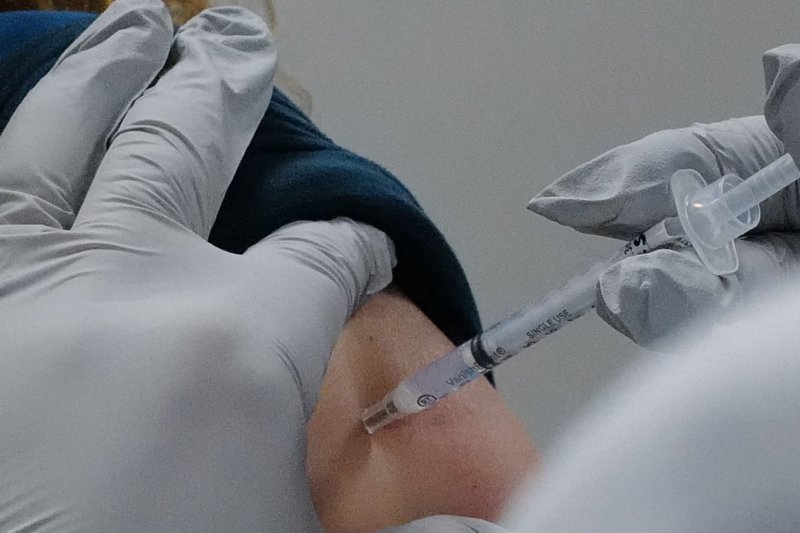COVID-19 vaccine rollout has been slow, but should speed up in the coming weeks, according to one expert. Photo by Gary I Rothstein/UPI |
License Photo
Jan. 6 (UPI) -- Rollout of the COVID-19 vaccines in the United States has gone slower than expected but should ramp up by the end of January, former U.S. Food and Drug Administration director Dr. Mark McClellan said Wednesday.
With fewer than 5 million people in the United States having received the shot as of this week -- well below the stated goal of 20 million by the end of 2020 -- federal and state governments will likely need to enhance outreach efforts and "expand partnerships with the private sector" to make that happen, he said.
"This is the most complex initiative in the history of U.S. public health," McClellan said during a call with reporters on Wednesday.
"[But] it's going to get better over time as we gain in experience," said McClellan, a physician and economist who directs the Duke-Margolis Center for Health Policy at Duke University in Durham, N.C.
The FDA, where McClellan served during the presidency of George W. Bush, has approved two vaccines against COVID-19 -- one manufactured by Pfizer-BioNTech and another from Moderna.
More than 17 million doses of both two-dose vaccines have been distributed nationally, with front-line healthcare workers and residents of nursing homes to receive first priority, according to the U.S. Centers for Disease Control and Prevention.
However, as of Tuesday, just 4.8 million doses of the two vaccines had been administered, the agency said.
Part of the shortfall may be linked with "little disruptions" in shipments from the two manufacturers, McClellan said.
Officials have also "held back some of the doses" to ensure those vaccinated receive both shots, he said.
Roughly 500,000 shots are being administered across the country on a daily basis but the incoming Biden administration has set a goal of delivering 1 million doses daily, according to McClellan.
That's achievable, provided that federal and state health officials address a number of ongoing concerns, including "pockets of skepticism and wariness around vaccines" within the general public, he said.
At least so far, few side effects have been reported, aside from 29 cases of anaphylaxis, according to the CDC.
However, efforts to educate the public on the safety of the vaccines has been lacking so far, with a CDC-led campaign not set to start until the end of January, McClellan said.
"I see that [delay] as a missed opportunity," he said.
Vaccine distribution to nursing home residents has been at least somewhat successful, fueled in part by government partnerships with the pharmacy chains CVS and Walgreens, according to McClellan.
That process is on pace to be completed by the end of this month, which is significant given that these older adults are at highest risk for severe complications from COVID-19, he said.
"As of right now, we are not aware of widespread issues or delays with this vaccine rollout, and if there were, we would be among the first to sound the alarm," the American Health Care Association and National Center for Assisted Living said in a statement.
"The majority of providers tell us that their clinics have been scheduled or have already occurred and that overall, the program is running smoothly," the groups said.
These programs could be expanded to include customers of these pharmacies living outside such facilities, given that they already have the infrastructure in place to deliver the flu vaccine, including computerized appointment systems, McClellan said.
Private medical practices and health insurance companies could also be considered for similar public-private vaccine distribution initiatives, he said.
"We want to make it as easy as possible for people to get vaccinated, with no long lines," McClellan told reporters.
"Vaccine supply isn't the issue, it's getting it into people's arms," he said.















